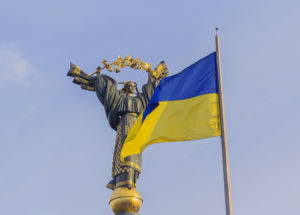
One feels a certain compulsion to write about cheery things at the start of each week. As we head into the depths of February, this is becoming an increasing challenge. Inflation rates are still rising, the price of oil is nearing $100/bbl and Russia has its tanks parked all the way around Ukraine’s accessible borders. It is not the greatest surprise that no one is in any rush to invest.
We have largely avoided commenting on Ukraine and Russia, but this is probably the right time to break cover. We can trace the roots of the current situation back to the break-up of the old Soviet Union in the late 1980s and early 1990s. The last 30 years have seen the West, or NATO, or Europe, or however one may wish to describe it, moving steadily closer to Russia’s borders. From a Russian perspective, there has been steady, aggressive creep across Eastern Europe. Russia’s previous exploits in Georgia and Crimea had shown, clearly, that Putin’s administration was taking the view that enough is enough. Particularly that a NATO-aligned Ukraine would be a step too far.
It feels as if the current situation suits both parties. It is impossible to know, at the moment, whether it is Russia, or the West, that bears the greater responsibility for creating the tension. Whether or not there will be a fight at the end of this, Putin has very successfully flexed his muscles. He may also have succeeded in re-uniting NATO. This is a lesson from the Baader-Meinhoff era, when the Group mistakenly believed that attacks on the German state would expose its repression. The reality was that the terror campaign united everyone in its support. It is likely that NATO will be stronger as a result of whatever now occurs, although certain comments about Munich might suggest that Putin is succeeding in exposing cracks within the Alliance.
Whilst clearly good news for companies that manufacture missiles, there are wider implications. The first is the supply of energy. According to the US Energy Information Administration, Russia is the world’s third largest supplier of oil and the second largest source of dry natural gas. Given our knowledge of the world’s half-hearted crawl towards carbon net zero, this makes Russia exceedingly important. It becomes doubly exceedingly important when the West is staring at both barrels of generationally high inflation and rising interest rates. The crawl towards reduced dependency on Russian fossil fuels needs a sharp kick up the backside. Inflation calculations need a lower oil price; having reports today that petrol pump prices have set new record highs in the UK is not what anyone needs to see.
Of my many investment prejudices, one of the longest standing is that portfolios should not invest in Russia. The reasons seem obvious. There are so many other fantastic opportunities that exist under the broad generality of ‘emerging markets’ that one should not have to worry about the geopolitical risk that goes with investing into Russian assets. I know others beg to differ.
Last week, headline US inflation rose to 7.5% and the core rate to 6.0%. Still the Federal Reserve thinks that it is right to have an interest rate of 0% and to be buying bonds each month. It is not our place to pretend to be Central Bankers, but it is hard not to see this as someone who sees their house on fire but who insists on having another cigarette before dialling 911. This week we have the latest update to the UK’s inflation calculations. It is unlikely to be pretty, but the Bank of England has at least started to raise interest rates.
Our investments remain focussed on businesses that we believe are best placed to prosper in a time of rising prices. This is in terms of both the strength of their products, and also their own balance sheets. As we say each week at the moment, the ride is going to stay bumpy for a while yet. Seat belts on.
Finally, I was right in thinking that Rat Trap would prove to be an easy one for many. Today is one of those annoyingly catchy lines: “satin and perfume and lace”.
Jim Wood-Smith – CIO Private Clients & Head of Research

FPC103
All charts and data sourced from FactSet
Hawksmoor Investment Management Limited is authorised and regulated by the Financial Conduct Authority (www.fca.org.uk) with its registered office at 2nd Floor Stratus House, Emperor Way, Exeter Business Park, Exeter, Devon EX1 3QS. This document does not constitute an offer or invitation to any person in respect of the securities or funds described, nor should its content be interpreted as investment or tax advice for which you should consult your independent financial adviser and or accountant. The information and opinions it contains have been compiled or arrived at from sources believed to be reliable at the time and are given in good faith, but no representation is made as to their accuracy, completeness or correctness. The editorial content is the personal opinion of Jim Wood-Smith, CIO Private Clients and Head of Research. Other opinions expressed in this document, whether in general or both on the performance of individual securities and in a wider economic context, represent the views of Hawksmoor at the time of preparation and may be subject to change. Past performance is not a guide to future performance. The value of an investment and any income from it can fall as well as rise as a result of market and currency fluctuations. You may not get back the amount you originally invested. Currency exchange rates may affect the value of investments.
